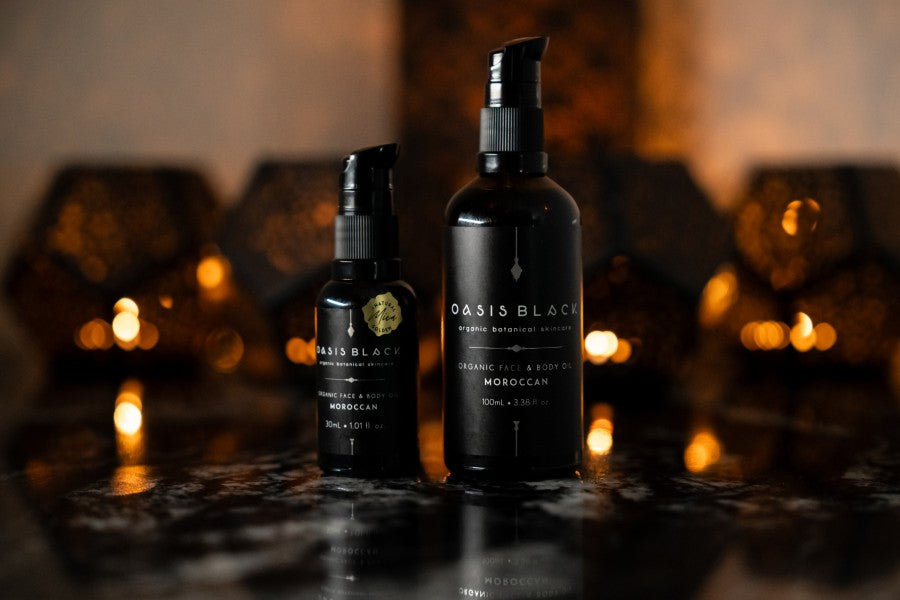How Natural Plant Oils can Help to Protect your Skin this Summer

As temperatures rise, so too can the number of environmental stressors our skin has to face – from dehydrating air-conditioned rooms, chlorine filled pools, heat and prolonged periods of exposure to the sun’s UV rays.

Nourished healthy skin
Dry, stressed and malnourished skin has little chance in defending itself against any environmental stressors. This means that the first step we need to take to protect our skin, is to ensure our skin has the food and nourishment it needs to build and maintain its own defences.
Contrary to popular belief, most mainstream water-based moisturisers are designed to sit on top of the skins surface. Because water is repelled (not absorbed) by the protective fatty lipid layer in the skin's stratum corneum (read more about this here), the molecules in water-based products tend to sit on top of the skin's surface until they are washed or evaporate away (taking some of your skin's naturally protective lipids with them). Repetition of this process weakens the skin's natural defences and encouraging the development of dry, itchy, irritated, inflamed and malnourished skin.
Effectively this means that mainstream water-based "moisturising" creams and lotions do little to nourish or feed your skin. Instead, in my opinion, water-based products only contribute to it's destruction (and this is why you'll never see me apply a water-based product to my skin).
Conversely, natural plant oils high in polyunsaturated fatty acids can penetrate deep into the skins dermis. Much deeper than mainstream creams and lotions can because only oils/fats can penetrate the protective fatty lipid layer of the stratum corneum in significant quantities1. This means that it's the oils/fats in skincare products, not water-based substances, that actually feed and nourish the skin.
So in order to build and maintain our skin's protective fatty lipid barrier, our skin requires an adequate and regular supply of topically applied nutrient dense skin loving oils/fats.
"Only adequately nourished and healthy skin can defend itself against environmental stressors"
Natural Sunscreen

What… you can use oils to protect your skin from the Sun?! I thought they just made skin burn easier?
No, not necessarily. Recently there has been increasing interest around the use of natural plant oils for sunscreens. Whilst not all oils offer protection from the Sun’s UV rays, and not all are strong enough for everyone and all situations, there have been studies that have suggested that some plant oils can offer some broad-spectrum UV protection.
For instance, this study showed the potential for Red Raspberry Seed Oil to be used as a broad-spectrum UV protectant, and others have suggested it has an SPF of 28+.
Further, this study found Carrot Seed Oil to have an SPF of 19, and there are also a host of other natural plant oils which have been shown to have SPF values up to 10 including Macadamia oil, Hemp seed oil, Avocado oil, Almond oil, Jojoba oil as well as my hero ingredient, Black Seed Oil.
Do Plant Oils Work as a Sunscreen?

From my own experience, whilst I was living in Morocco, I found my Face & Body Oils to be a great all-over daily sunscreen.
In addition to my regular daily skincare routine, when I was at the beach or out in the sun, I would apply my Oils throughout the day just like you would do with any other mainstream sunscreen. Surprisingly, despite spending a lot of time in the Moroccan sun without mainstream sunscreen on, I rarely got burnt.
Upon returning to Australia however, where the sun’s rays are stronger thanks to the thinning in the ozone layer, I found that I couldn’t rely solely on my Oils if I wanted to spend extended periods of time in the sun.
Interestingly though, compared to a previous time when I used mainstream water-based moisturisers, my skin takes much longer to burn now. Further, the areas that I apply my Organic Face & Body Oils to twice daily (eg my face), will take much longer to burn than the other areas of my body where I don’t apply my Oils to as regularly (eg my back/stomach).
While natural plant oils can provide some level of protection from UV rays, you shouldn’t expect plant oils to work in the same way as mainstream sunscreens do - i.e. don't expect them to work immediately, upon your first application, especially if you have dry, damaged or malnourished skin to begin with. Rather, long term and regular use of natural plant oils can help build and support your skin's natural environmental stressor fighting capabilities.
To give your skin the best chance it has to protect itself, you need to incorporate the use of natural plant oils into your routine long before you step out in to the sun.
For extended exposure to the sun, I recommend using plant oils as part of a broader sun protection strategy. This includes using physical barriers like shade, clothing and/or physical sunscreen's (aka mineral sunscreen) that work by forming a physical barrier on top of the skins surface and reflect UV rays away. Examples of physical sunscreens are products that contain Zinc Oxide (non-nano), clays, waxes and other natural substances that can be washed off the skin after use.
If possible I suggest avoiding using the more common Chemical Sunscreens at all costs. Aside being laden with endocrine disruptive, carcinogenic and toxic chemicals, Chemical Sunscreens are designed to chemically interact with UV rays under the skins surface. The resulting toxic chemical concoction created by the interaction of the UV rays with the absorbed chemicals can't simply be washed off. Instead it's the body's internal organs that are left to deal with the newly created unfamiliar, unnatural and toxic chemical compounds.
Furthermore, if you care about the environment at all, please please please never support Chemical Sunscreen companies that make their products using reef killing chemicals like oxybenzone - watch more on this below.






















